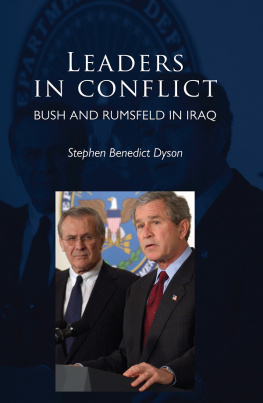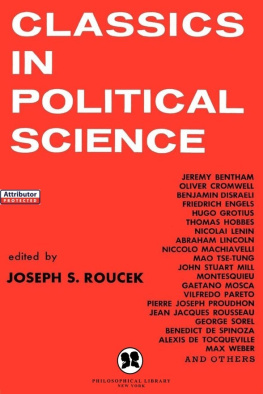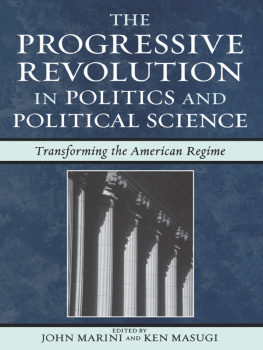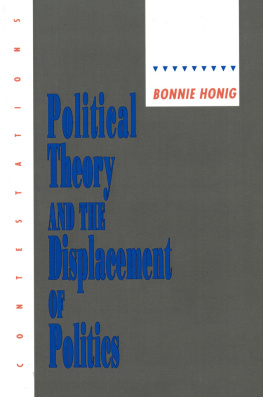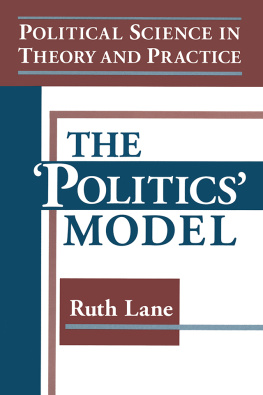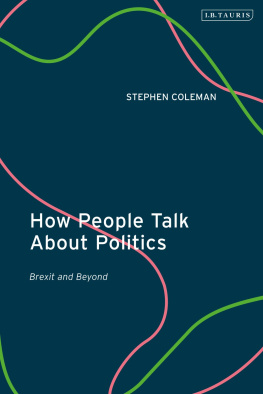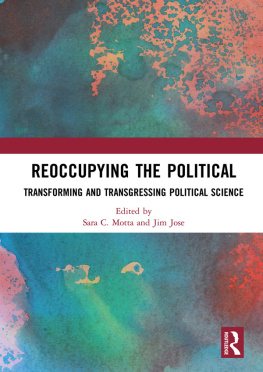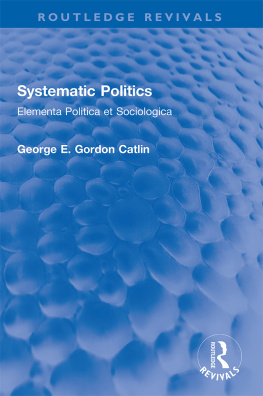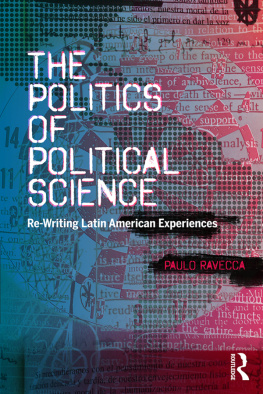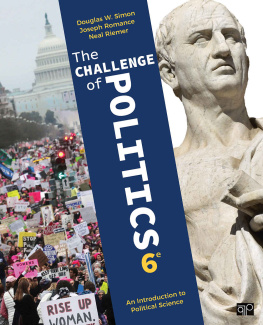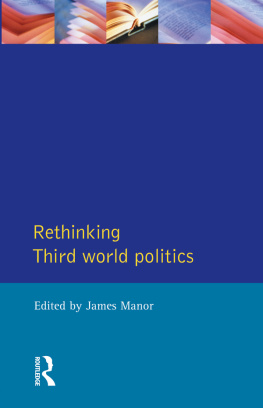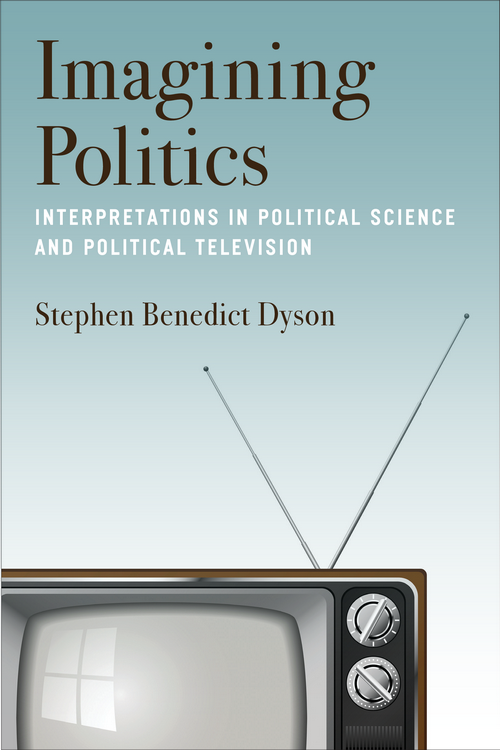
Imagining Politics
Imagining Politics critically examines two interpretations of government. The first comes from popular culture fictions about politics, the second from academic political science. Stephen Benedict Dyson argues that fictions and theories both function as attempts at meaning makingmaking sensible the otherwise insensible realm of political behavior.
By taking fiction seriously, and by arguing that political science theory is homologous to fiction, the book offers a fresh perspective on both. The specialist is challenged to think anew not just about fictions such as The West Wing, House of Cards, Borgen, Black Mirror, and Scandal, but also about the assumptions that construct the discipline of political science itself.
Imagining Politics is also about our political moment. The two populist shocks of our timeBrexit and the election of Trumpare set in a new context here. Dyson traces how Trump and the Brexiteers campaigned against our image of politics as usual, and won.
Stephen Benedict Dyson is Professor of Political Science at the University of Connecticut.
Imagining Politics
Interpretations in Political Science and Political Television
Stephen Benedict Dyson
University of Michigan Press
Ann Arbor
Copyright 2019 by Stephen Benedict Dyson
All rights reserved
This book may not be reproduced, in whole or in part, including illustrations, in any form (beyond that copying permitted by Sections 107 and 108 of the U.S. Copyright Law and except by reviewers for the public press), without written permission from the publisher.
Published in the United States of America by
the University of Michigan Press
Manufactured in the United States of America
A CIP catalog record for this book is available from the British Library.
ISBN 978-0-472-07424-2 (hardcover : alk. paper)
ISBN 978-0-472-05424-4 (paper : alk. paper)
ISBN 978-0-472-12588-3 (ebook)
I dedicate this book to Rosa Emilia, with love.
Contents
Digital materials related to this title can be found on the Fulcrum platform via the following citable URL: https://doi.org/10.3998/mpub.10191802
Page viii Page ix
How do we make sense of politics? This book looks at two ways of making political meaning: (1) academic theories of political science and (2) fictional televised portrayals of how government works. I argue that the two have surprising similarities. Both political science theories and televised political fictions are based on assumptions about politics, directing our attention to some things and away from others, telling some stories but not others. By setting these two sources in dialogue, our images of politics are revealed, and we expose a central way in which our society thinks about itself.
I have had some valuable help in writing this book. My lively colleagues Alexander Anievas, Fred Lee, and Tom Hayes read drafts of the manuscript and gave excellent feedback. Tom and another valued colleague, Prakash Kashwan, accompanied me to the Trump rally described in the book. That was an experience. Jeff Dudas went above and beyond, providing extensive written feedback and moderating a workshop on the draft manuscript. Students in my Screen Politics seminar worked with an earlier version of the text and helped me sharpen its arguments. My mum and dad, as has been the case with each of my books, dove into the text and offered plentiful commentary ranging from line edits to critiques of the whole argument. Reviewers for the press offered many good suggestions, and I hope they are pleased with the changes I made in response.
Elizabeth Demers at the University of Michigan Press saw the project through from proposal to completion. I am grateful for her staunch support of what is a somewhat unconventional work. John Sides at the Monkey Cage, a political science site hosted by the Washington Post, published related essays of mine as I dove deeper into the topic of politics and popular culture. I am similarly grateful for his support of this unusual angle on political science.
Page x Page 1
Senator Richard Monckton, candidate for the presidency of the United States of America, climbs out of his black sedan and glowers. He could greet the voters in the crowd in front of him, but instead he stands stock-still. Shoulders hunched. Eyes narrow and dark. Suddenly journalists and cameramen flood the scene, and Monckton is alive. A smile erupts across his face. He plunges into the crowd, slapping hands and grabbing arms. Yeah! Yeah! Yeah! The crowd surges, the flashbulbs explode again and again. Good to see you! Yeah! At the doorway of his office building, he gives a sweeping wave to the crowd. Yeah!
Once he is inside the building, his arms quickly return to his sides. His shoulders resume their hunch. His eyes become narrow once more. He is locked in a struggle for power in Washington, DC. The retiring president is plotting to steal the election from Monckton. The CIA director is being blackmailed by the president. The FBI is involved. It is a deep-state conspiracy, hidden from public view.
Monckton is the fictional protagonist of the television miniseries Washington Behind Closed Doors (1977), which was inspired by Richard Nixons years in office. It was based on the book The Company by Nixon hand John Ehrlichman, who tried to make sense of his experiences in Washington by writing a work of fiction. The details were made up, but the deeper truthsthe malevolence, the infighting, the venality of the political elitewere authentic. The show reflected a new cultural disillusionment with a political class that had brought about Vietnam and Watergate. Transmitted through the now ubiquitous medium of television, Washington Behind Closed Doors reflected and reinforced new anxieties about American government.
At the same time that television executives green-lit this ominous interpretation of American politics, political scientists were also trying to make sense of the era. Most had abandoned the belief that careful analysis of the Constitution was all that was required to understand politics. The hopeful verities of mid-centurythat a liberal consensus reigned in an Page 2 empire of reasonwere less and less persuasive. Instead, political scientists now argued, politicians must be seen for what they are rather than what we wished them to be: self-interested actors getting away with anything they could. The new theory of government was that it was an insider game rather than a transparent and virtuous public square.
This book is about politics in our imaginations as they are guided by televised fictions and the academic discipline of political science. Its argument is that political fictions and political science speak to the historical and cultural moment that produces them, reflecting and shaping the beliefs and anxieties of their time and place. They speak to each other too. They are structures of interpretation that paint pictures of our politics.
From the sophisticated way my students have engaged with earlier versions of this argument, it is clear that they already know that television shows are meaningful sites of cultural conversation. Some of my scholarly colleagues, though, might think these fictions are nothing more than entertainment. It seems wise to begin, then, with a few words about the genesis of the book and the scope and limits of its argument.
Imagining Politics contends that political science theories and televised political fictions are both interpretations of government. As we will see in the chapters to come, these dual interpretationsone seeking the status of scientific objectivity, the other demurring that it is just telling storiesimagine politics to be about self-interested elites pursuing and using power.
Next page

